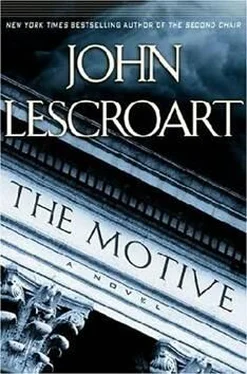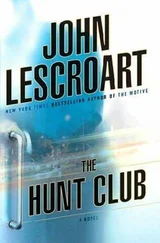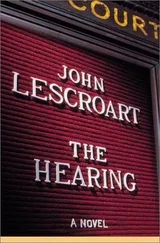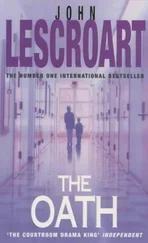"I'm sorry about that. Next time I'll remember." He pushed himself back against the headboard. "What was that motivation you talked about tonight?"
"When?"
"When Aaron asked why you'd gone to see Dad that day."
She stopped moving, let out a long breath, still facing away from him. Slowly she turned full around, holding one of his folded T-shirts. Finally, she shook her head slightly from side to side. "I guess I just got tired of not knowing where we were going to stand. Saul starts college in a little over a year, and he's the first of the grand-kids. I'd talked to Beth and Mary and both had asked if I'd heard anything from your dad, what with Sophie and Pablo right behind Saul. So I just thought I'd go get it from the horse's mouth." She was wringing the T-shirt between her hands. "Then, as you heard, we got on to other things." "Missy."
"Among others." "Did you have words?"
"Some. Nothing worse than usual. We just talked, maybe argued a little. But it was all his decision, and there was really nothing to fight about. Besides, your father, as opposed to your mother, likes me. Or should I say liked."
Will shrugged. "He liked attractive women. So does his son." He patted the bed next to him. "Speaking of which, you're looking good tonight, especially to a man who's just spent five days at sea. Are you planning on coming to bed?"
"Eventually," she said. "I usually do."
"I've missed you," he said.
Biting her lip, nodding to herself, she turned back to the dresser, dropped the crumpled T-shirt into the open drawer. Clearing her throat, she said, "Let me go check on the kids," then left the room.
The assistant district attorney who handled arson cases was Chris Rosen. He'd been a prosecutor for nine years now, after first serving a year fresh out of law school as a clerk for Superior Court Judge Leo Chomorro. So he'd lived his entire legal life in the Hall of Justice at Seventh and Bryant. Rosen thrived in the environment.
An old-fashioned, hard-on-crime professional prosecutor, he didn't believe that he'd ever seen an innocent person in custody. "You don't get all the way to arrested-and believe me, that is a long, long way- unless you did it," he liked to say. "That's the truth, it always has been and always will be nothing but the truth, so help me God."
Unmarried and slightly unkempt, with an easygoing personal style, he often grew a day or two's stubble when he wasn't due in court. His dark hair licked at the top of his collar. The conscious image he projected was borderline blue collar, a guy with no special passion for prosecuting his fellow citizens. He was just a regular working dog going about his business, doing his job. Nobody to worry about. Attorneys who hadn't already faced him in court found out the truth soon enough, and often found themselves on the defensive from the get-go, blindsided by his cold passion.
"No law says you can't come across out of court as sympathetic, you know, a little… sensitive," he was saying over midnight drinks to Dan Cuneo as they sat at the bar at Lou the Greek's. "Then you get 'em in court, suddenly I'm the iceman and whop 'em upside the head. They don't know what hit 'em."
Rosen's experience had taught him that he needed every advantage he could get in San Francisco, where juries tended to see their main role as finding some reason, almost any reason-stress, hardship, bad luck, unfortunate upbringing-to let defendants off. There always lurked some mitigating factor, some reason for juries to forgive.
"Hey, but enough about me." Rosen sipped at his single malt. It wasn't anywhere near his working hours on a Friday night. He was out here now with his Oban on the rocks as a favor to his main-man arson inspector Arnie Becker, and also because the recent double-homicide fire was going to be the biggest case he'd tried to date. "Becker says you got a lead on Hanover."
Cuneo, on duty, drank Cherry Coke, no ice. "You know the basics?"
"Not much beyond Hanover and his girlfriend."
"All right." Cuneo tapped his fingers on the bar. "There was this couple, Maxine and Joseph Willis…" Drinking more Cherry Coke, fidgeting in his chair, continuing his percussion on the bar top, Cuneo laid out for Rosen the originally conflicting stories of the Willises- how Maxine had seen Missy D'Amiens leave the Hanover house within minutes of when the fire must have started, how Joseph had been uncertain-it might have been somebody else. Then there was Jeffie at the Valero station who volunteered that someone who looked something like her, but had different hair, had bought gasoline in a container and put it into her trunk.
"I'm still listening," Rosen said. "So you've got a woman who resembled this Missy."
"Well, wait. More than that. I've got a true fox, middle-aged…"
"Which one?" Rosen asked. "A fox or middle-aged?"
"Both." At Rosen's skeptical look, Cuneo said, "It happens. You'd seen her, you'd believe it. Anyway, she's in jeans and a shiny blue shirt, black leather jacket, driving a Mercedes, buying a container of gasoline and then coming out of Hanover's house a few minutes before it goes up."
"If it's all the same woman."
"Right. Of course. It was."
"Which means?"
"Which means, what if she had a motive?" Cuneo waited, but Rosen didn't bite. "Which she did."
"So you're telling me you've got a suspect."
"Not quite yet. I'm close. Light on physical evidence, but loaded with probable cause."
"You want a warrant," Rosen said.
"Yep, yep, yep." Cuneo bobbed his head, tattooed the bar with a final paradiddle. "Becker says you're tight with some judges."
Rosen shrugged. "The question is, can we make the case. I don't want to bring anybody in front of a grand jury and have nothing to talk about." He cast his eyes around. "I need a narrative. If I buy it, I can sell it to whoever's signing warrants."
Cuneo willed himself still, met Rosen's eye. "Grand jury's Tuesday, right?"
"Every week. You're thinking that soon?"
"I can do the search tomorrow if we can get a warrant now. We'll know by Sunday. Is that enough time for you?"
Rosen swirled the last of his Scotch and drank it off. "Plenty," he said.
Glitsky used police magic to find the address he wanted. Now, just before ten o'clock on Saturday morning, he was walking up Russian Hill in bright sunshine to the door of an enormous three-story brown box of a building on the corner of Green and Larkin. He stood in the covered entryway for a minute, trying to imagine what a place this big, in this neighborhood, would cost. Decided it didn't bear reflection. From his perspective, it was all the money in the world.
He rang the doorbell and listened as chimes sounded behind the double doors-etched glass in carved dark wood. After a long, silent moment, a short female figure appeared behind the glass and opened the door. In a black uniform with a white apron, she smiled formally and, seeing that Glitsky was a man of color in casual clothes said, "Deliveries are in the back."
Producing his wallet, Glitsky displayed his badge.
"I'm Deputy Chief of Inspectors Abe Glitsky. I wonder if I might have a word with Mr. Granat."
"Do you have an appointment?"
"No, ma'am. I was hoping to catch him in."
"Is this, then, official police business?"
"I'd just like to talk to him, if he can spare a minute."
"Certainly," she said. "I'll see if he's available." She turned, had a thought and turned again. "Would you care to wait inside?"
Glitsky crossed the threshold into the house and watched the maid walk down the long hallway and then somewhere off to her left. She'd left him standing on a burgundy Oriental carpet that was larger than Glitsky's living room, yet still did not quite reach the walls around the grand foyer. Even with the sunshine outside and the windows behind him, even with the six-foot chandelier and its fifty bulbs lit above him, the space was dim. No sound came from the rest of the house, and only gradually did Glitsky become aware of the ticking of a clock, although he couldn't locate its source. His eyes went to the art-dark oils in large burnished gilt frames-hung in the spaces between doorways. They were frankly-he thought purposefully-disturbing, all blacks and reds, flesh and blooded browns. Erotic overtones, sexually ambiguous-hints of nakedness amid industrial waste, a pack of dogs gathered over something not quite identifiable in a graffitied doorway.
Читать дальше












